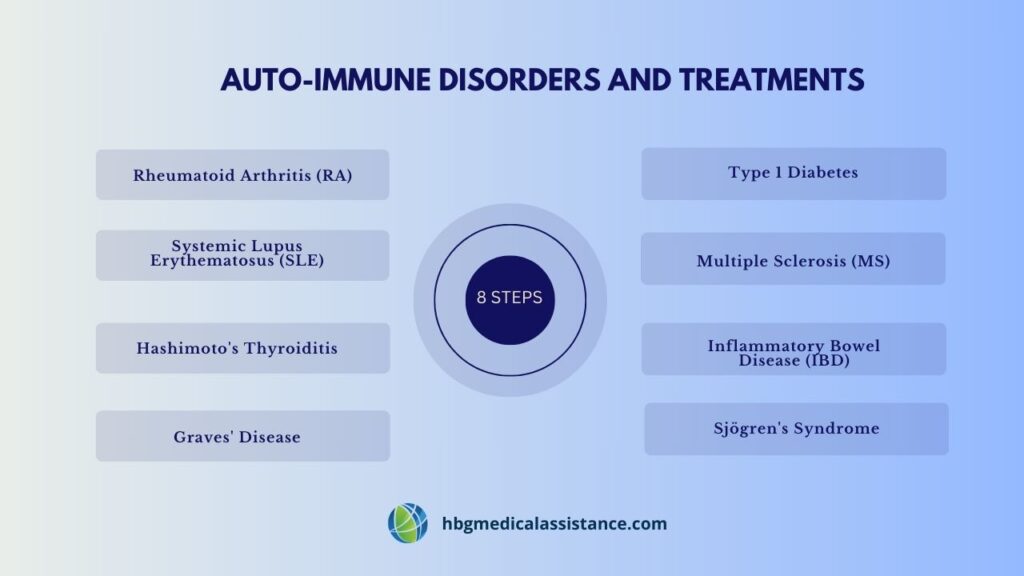
Autoimmune diseases represent a diverse group of disorders characterized by an abnormal immune response against the body’s own tissues. In these conditions, the immune system, which is designed to protect the body from foreign invaders like bacteria and viruses, mistakenly attacks healthy cells and tissues. This can lead to a wide range of symptoms and complications affecting virtually any part of the body.
The underlying causes of autoimmune diseases are complex, involving a combination of genetic predisposition, environmental factors, and dysregulation of the immune system. While the exact triggers vary depending on the specific autoimmune condition, potential factors may include infections, hormonal imbalances, certain medications, and exposure to toxins or chemicals.
There are over 80 recognized autoimmune diseases, each with its own unique set of symptoms, diagnostic criteria, and treatment approaches. Some common examples include rheumatoid arthritis, systemic lupus erythematosus, multiple sclerosis, type 1 diabetes, and inflammatory bowel disease. Despite their diversity, many autoimmune diseases share overlapping features, such as chronic inflammation, tissue damage, and periods of remission.
Diagnosing autoimmune diseases can be challenging due to their wide array of symptoms and the fact that they often mimic other conditions. Healthcare professionals typically rely on a combination of medical history, physical examination, laboratory tests, and imaging studies to establish a diagnosis.
Treatment strategies for autoimmune diseases aim to modulate the immune system to reduce inflammation and alleviate symptoms while also addressing any underlying factors contributing to the disease process. Depending on the severity and nature of the condition, treatment may involve medications such as corticosteroids, immunosuppressants, or biologic agents, as well as lifestyle modifications, physical therapy, and dietary interventions.
While many autoimmune diseases are chronic and require lifelong management, advancements in research and medical technology have led to significant improvements in diagnosis, treatment, and outcomes for affected individuals. Ongoing efforts to better understand the underlying mechanisms driving autoimmune diseases and to develop targeted therapies hold promise for more effective and personalized approaches to care in the future.
Diagnosis of an autoimmune disorder becomes challenging as these disorders mimic symptoms of certain other diseases. However, these diseases can be diagnosed by knowing factors like physical condition, medical history and certain investigations as follows:-

So here are some of the common autoimmune disorders and treatments available with HBG Medical Assistance –
1. Rheumatoid Arthritis (RA): RA is a chronic inflammatory disorder that primarily affects the joints, leading to pain, swelling, stiffness, and eventually joint deformity. It can also affect other organs, such as the skin, eyes, lungs, and heart.
Treatment— The treatment for Rheumatoid Arthritis includes treating the symptoms, i.e., pain and swelling in the joints through medical management as the first line of treatment. However, patients with severe RA may require a Total Hip Replacement surgery or a Total Knee Replacement surgery where necrosis of the bones occurs due to Rheumatoid Arthritis.
2. Systemic Lupus Erythematosus (SLE): SLE is a systemic autoimmune disease that can affect multiple organs and tissues, including the skin, joints, kidneys, heart, lungs, and brain. Common symptoms include skin rash, joint pain, fatigue, fever, and organ inflammation.
Treatment – The treatment for Systemic Lupus Erythematosus (SLE) focuses on treating the symptoms and to preventing organ damage through medical management. Also, Biological Therapy may also be used to reduce the auto immune response.
3. Hashimoto’s Thyroiditis: Hashimoto’s thyroiditis is an autoimmune condition characterized by inflammation of the thyroid gland, leading to hypothyroidism (underactive thyroid function). Symptoms may include fatigue, weight gain, cold intolerance, constipation, and dry skin.
Treatment – The treatment for Hashimoto’s Thyroiditis includes medical management, Thyroid Hormone Replacement Therapies and some lifestyle changes. In severe cases, the disease leads to the formation of goitre or thyroid nodules, which require surgical intervention such as a Hemi/Total Thyroidectomy.
4. Graves’ Disease: Graves’ disease is an autoimmune disorder that causes overactivity of the thyroid gland (hyperthyroidism). Common symptoms include rapid heartbeat, weight loss, tremors, heat intolerance, and bulging eyes (exophthalmos).
Treatment – Treatment for Graves’ Disease focuses on symptomatic treatment through medical management, which includes thyroid hormone replacement therapy and Radioactive Iodine Therapy or sometimes a thyroidectomy can be done in severe cases. Patients suffering from Graves’ Disease also experience pressure on the eyes, which in serious cases require an Orbital Decompression Surgery.
5. Type 1 Diabetes: Type 1 diabetes is an autoimmune condition in which the immune system mistakenly attacks and destroys the insulin-producing beta cells in the pancreas. This results in insulin deficiency and elevated blood sugar levels, leading to symptoms such as excessive thirst, frequent urination, weight loss, and fatigue.
Treatment – The treatment for Type 1 Diabetes includes medical management to control blood sugar levels through insulin therapy and some lifestyle changes. This disease may also result in organ failure, such as Kidney for which a patient may require a Kidney Transplant.
6. Multiple Sclerosis (MS): MS is a chronic autoimmune disease that affects the central nervous system (brain and spinal cord). It causes inflammation, demyelination (damage to the protective myelin sheath), and impairment of nerve function. Symptoms vary widely but may include fatigue, muscle weakness, numbness or tingling, balance problems, and vision changes.
Treatment – The treatment for multiple sclerosis involves symptom-specific treatment through medical management. However, a Bone Marrow Transplant may be done in some cases to treat the autoimmune disease.
7. Inflammatory Bowel Disease (IBD): IBD encompasses two main conditions: Crohn’s disease and ulcerative colitis. These are chronic inflammatory disorders of the gastrointestinal tract characterized by abdominal pain, diarrhea, rectal bleeding, weight loss, and fatigue.
Treatment – The treatment for Inflammatory Bowel Disease (IBD) focuses on treating the symptoms through medical management. Biological therapies are also prescribed to the patient suffering from the disease. Surgical intervention may be necessary for complications of IBD. Surgeries like Fundoplication or Fistula Repair may be required to treat complications of IBD, such as intestinal strictures, fistulas, or severe inflammation that does not respond to medical therapy.
8. Sjögren’s Syndrome: Sjögren’s syndrome is an autoimmune condition that primarily affects the moisture-producing glands, leading to dryness of the eyes and mouth. It can also cause systemic symptoms such as joint pain, fatigue, and organ inflammation.
Treatment – The treatment for this disease includes symptomatic treatment via medical Drops, Saliva substitutes and moisturizing mouthwashes, moisture chamber goggles and other medications that can treat the symptoms.
These are just a few examples of the many autoimmune disorders that can affect individuals. Each autoimmune disease has its own unique characteristics, symptoms, and treatment approaches, and diagnosis and management often require collaboration between various healthcare providers and specialists.




Cancer Treatment in India, VSD Closure (Ventricular Septal Defect), ASD Closure Surgery (Atrial Septal Defect), Heart hole closure surgery in india, Brain Tumour Surgery in India, Craniotomy Surgery for Treatment of Brain Tumour in India, Brain Stem Glioma Treatment in India, Deep Brain Stimulation surgery in india , Best Spine Surgery In India , Cervical Spine Disorders Surgery and Treatment in india , epilepsy surgery in india , Heart Surgery in india , Best open heart surgery hospital in India , All about Spine Surgery, Types of Back Surgery , Top Doctors In India , Best Hospitals in India , Bhavin Desai cardiac surgeon, Best kidney transplant doctor in IndiaBest hospital for limb lengthening surgery in India, Best hospital for neurosurgery in India, Best hospital for bypass surgery in India, Narayana Hrudayalaya online appointment, Best orthopedic hospital in Bangalore, Best open heart surgery hospital in India, Best bypass surgeon in India, best spine surgery hospital in India, Artemis hospital Gurgaon, KD hospital medical appointment
Limb lengthening surgery cost in India, DSA test, Diabetes treatment in India